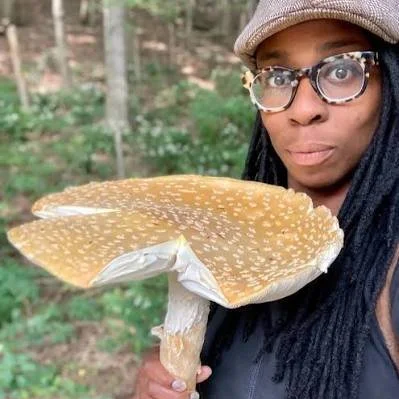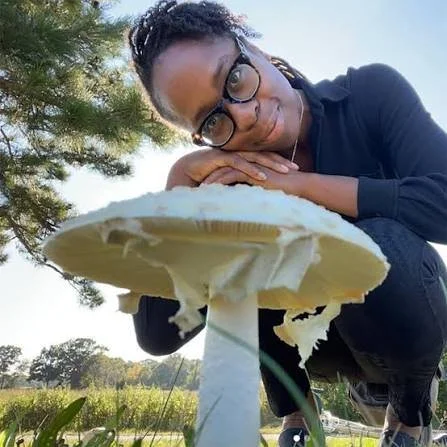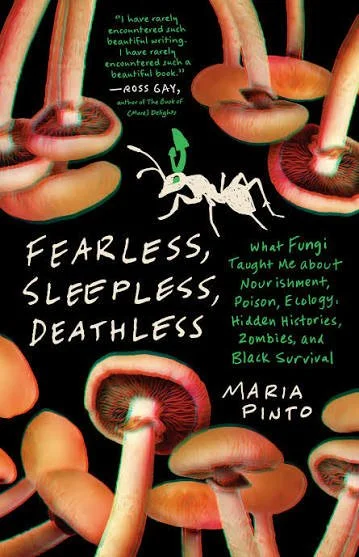Maria Pinto
What is Fearless Sleepless deathless about?
Fearless Sleepless Deathless is a collection of lyric essays about the hunt for a specific type of mushroom. Sometimes literally the hunt and sometimes figuratively or proverbially the hunt.
For instance, I have a chapter, or an essay, in the book called ‘In Search of Ophiocordyceps Unilateralis,’ and in it, I explore that fungus and other insect parasitizing fungi as well–like the zombie ant fungus. If you're familiar with shows and video games like ‘The Last of Us', that zombification of the world happens because Ophiocordyceps Unilateralis has made the jump from ant to humans–which would never happen–but it makes for good TV.
I also explore the Haitian history of the zombie; not a lot of people know that the zombie comes from Haiti. The spiritual aspect of it was born in a Haitian context during plantation slavery and has persisted till now in a very changed state. The original zombies weren't brain eaters. They didn’t bring on the apocalypse or anything. It was a spiritual idea.
Throughout the book, I do things like that: I interview people, I talk about the work they're doing within the field of ecology and the study of mushrooms, I do some nature writing [and] science writing. There is a bit of memoir in it because the publishers wanted to see a little bit more of me. I was not originally inclined to get that deep into my own life, but I'm glad I did. So, it’s very much a mix.

How did you make the connection(s) between mycology, race, and society and culture?
The connection is pretty easy; it's already there. Fungi are very important organisms. Ecologically, they do extremely important work.
But they also exist on the margin.
Not many people know that upwards of something like 97% of vascular plants, or trees, have a fungal partner. Fungi have this [mutualistic] partnership with trees.
The food that the trees are making, the fungi get a cut of that, and, then, in turn, they extend the trees’ root systems and make it possible for the trees to get other nutrients from the soil.
Without that sort of give and take, the trees that you see around you would not be as robust.
It's so important, the work that they do, but they're so understudied and underappreciated. They're treated with derision and disgust. They're thought of as weird and gross and otherworldly. And yet, they make our lives possible.
I know a lot of black folks who can relate to that way of moving through the world and to that kind of treatment and that wanting to be cast aside by society.
So, the connections are really there and very visible, but moving silently and with humility.

What initially sparked your interest in mushrooms and what about them is so important to you?
They're important for supporting our lives on this planet.
Without them, we'd be up to well above our heads in, like, plant matter.
I have always loved delicious food. I'm from Jamaica, originally, [and] grew up in South Florida. When I first moved from Jamaica, I was on a farm, so fresh food has always been important to me.
When I got to college, I fell in with the hippies who would have herb and foraging walks. I learned some edible plants.
After college, I met a woman who grew up in Poland, and mushroom hunting was a national pastime. So when she came to the States, she learned some of the foolproof ones (they call them the foolproof ones that you can be assured won't kill you because they don't look like anything else).
I went to a party at her house one time, where she was giving away Hen of the Woods, which I have. Hen of the Woods mushrooms are extremely large. I once held a 35-pound one.
You can prepare these so that they taste just like meat. I actually make–if I do say so myself– a delicious Hen of the Woods jerky.
But anyway, she sent people away with their own Trader Joe's bag of Hen of the Woods, and I was looking at them at that party and just being like, ‘wow, these are really cool and stunning and delicious. I wanna know more about these organisms.’
I went off the deep end and went down several rabbit holes. There's so much to study about them. There's so much to learn, and you can never learn it all.
There's supposed to be somewhere from two million to like five million different types of fungi that exist. Western Science has named only about 155,000 of them.

How did your concentrations here at Dreyfoos influence what you do now?
In all ways; it was so important. At Dreyfoos, we were really encouraged to take our writing seriously.
I was editor of Seeds back in the day.
My time at Dreyfoos was very important because it really did have me thinking about seriously becoming a writer as a career.
I went on to do an undergrad creative writing degree up here in the Boston area, met some very important mentors, and continued with all that I had learned while I was at Dreyfoos.
Taking a speech and debate class definitely helped me in the world that I inhabit now because I am giving speeches. I've done several keynotes at psychological conferences at this local Land Conservancy, where I'm on the board.
I host mushroom walks every other month at the Arnold Arboretum, which is Harvard's Tree Park here in Boston. And it all requires public speaking. So, even though I was shy about it, back in the day, and not necessarily the biggest speech and debater, the skills that I learned have definitely been useful in my current life.
I'm jurying for Young Arts, which [requires] a lot of the same skills, [like] reading submissions and rating them. I do that kind of work a lot. I sit on many different juries, so all of the skills have come in handy.
Even TV production, because I make content online, and making content was one of the things that caught the editor's eye later and made him ask me if I wanted to write the book. Having an eye catching video or reel is definitely useful for all sorts of career modes.

Do you have any future plans after your book comes out? If so, what are they?
I am already working on a couple of different projects. One long form essay, which will be in a magazine next fall. I'm also working on a new novel.
There are a lot of students here that are writers, and they want to publish books of their own in the future. What is some advice you have for them in navigating the publishing process?
I would say, first and foremost, is to make sure that you are passionate and make sure that you are part of the community that would be supporting your work.
Literary citizenship is so important and is where so many of the connections that we need to make in publishing occur.
So many of the connections I'm making now, in terms of bringing the book into the world, came from my time working at Grub Street. I would say that if you want to publish, you should obviously be familiar with the work of the publication that you're looking to publish with.
You should read many titles from them. If you're talking about a book length project, you should read the literary journal. If you're talking about the literary journal, be very familiar with the kinds of work they do. Try to familiarize yourself with the people they publish. It's all about networking.
It's all about having mutualistic relationships and having a give and take and having reciprocity with the people that you make these connections with.
The connections are so important in publishing and just making sure that you live passionately and out loud among the communities where you want to be publishing.
It's the best way to get your foot in the door because then people know who you are, and you're a known quantity.
Check her out and buy her new book!
https://uncpress.org/9781469689791/fearless-sleepless-deathless/





